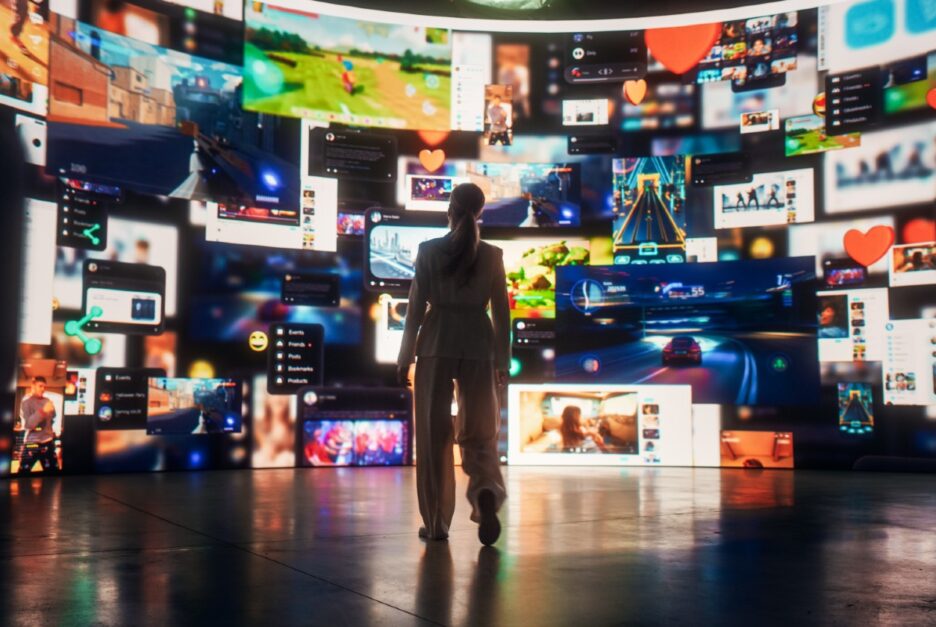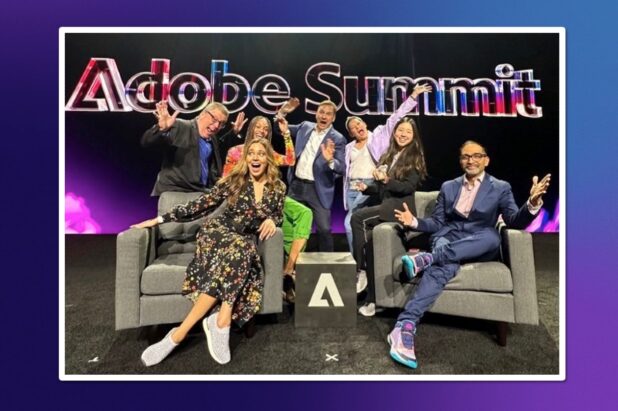When it comes to maximizing the impact of partnering with the most trusted voices in your industry, strong relationships are essential for sustaining an always-on influencer marketing strategy.
At the heart of any successful B2B influencer program is the strength of the brand-influencer relationship. Without trust, alignment, and a shared commitment to delivering value, it’s nearly impossible to create the kind of content that buyers find credible, discoverable, and worth engaging with.
That’s why in our latest research, we examined what top-performing always-on marketers are doing to establish, nurture, and protect those critical connections with industry influencers. Here’s what we found:
- 52% rely on effective management technology. These tools are designed for more than just finding influencers – they help manage relationships, track campaign performance, and measure ROI with precision.
- 50% use training and development programs to ensure the influencers they work with fully understand the brand, its solutions, and its unique value proposition.
One of the most striking differences between brands using an always-on approach and those that aren’t is how they choose who to work with. Those committed to building long-term partnerships are 1.5x more likely to follow rigorous selection practices – ensuring not only that an influencer’s voice can authentically amplify the brand, but also that they’re the right fit as a strategic business partner.
Brand reputations are being shaped by real people. We need voices that are credible to connect with brands to deliver the message. Ty Heath, The B2B Institute at LinkedIn
At TopRank Marketing, we’ve seen this play out time and again: when you invest in the right influencers and treat them as collaborators rather than campaign assets, you create a foundation for thought leadership that drives both trust and measurable business impact.
In this post, we draw from our 2025 B2B Influencer Marketing Research Report including 4 top B2B marketing experts who help shine a light on best practices for always-on influence, influencer content and differentiating your brand with the right influencers. To bring it all together, there’s an informative and inspiring case study.
Best practices for an always-on B2B influencer marketing strategy
“An always-on influencer marketing strategy involves continuous engagement with influencers to foster authentic, long-term relationships. In my opinion, some key elements include:
- Consistent relationship building: Engage influencers regularly, even outside of campaigns, to create trust and alignment with brand values. This enables influencers to become genuine brand advocates.
- Content integration: Develop ongoing collaborations where influencers naturally integrate your brand into their content, keeping it relevant to their audience over time.
- Data-driven decisions: Regularly monitor influencer performance using metrics like engagement, reach, and conversions to optimize strategies and stay agile.
- Multi-channel presence: Maintain an active presence across various platforms where your target audience and influencers engage, such as LinkedIn, YouTube, and Instagram.
- Content calendar: Develop a strong editorial calendar to plan and schedule influencer content consistently, ensuring alignment with broader marketing goals and maintaining a steady stream of brand-relevant content.”

Ryan Bares
Manager, Influencer Relations & Employee Advocacy Programs, IBM
Top content types that influence your audience
According to our research, social media posts lead the way as the most effective content type for B2B influencer marketing programs – by a 17-point margin. This finding reinforces what we see every day: in a digital-first buying journey, the right influencer content in the right channel can spark meaningful engagement at scale.
In line with the Experiential Content pillar of our Best Answer Marketing framework, all of the top content formats for influencer marketing deliver experiences from in-person events to webinars and interactive content to videos, livestreams and podcasts.
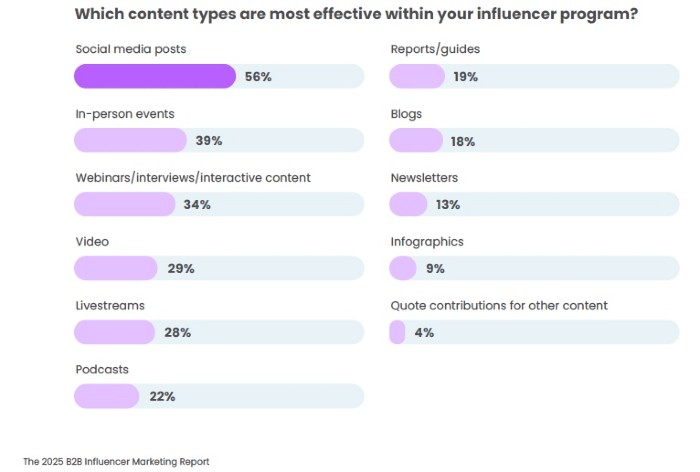
Authenticity works across all B2B influencer content types
“In my experience, the most effective content types for influencer collaborations — social media posts, webinars, and in-person events — all share one key factor: they involve real people speaking directly to an audience.
This human connection is what makes video so powerful. When people see a face, they’re more likely to trust the message and feel connected. Video brings out the authenticity of an influencer, allowing them to communicate emotion, tone, and personality in ways that text or images can’t. This direct interaction builds trust, engages viewers more deeply, and fosters stronger relationships with the audience.”

A. Lee Judge
Co-Founder and CMO at Content Monsta
Matching content types to your purpose
“I like to think about how I can bring influencers into every aspect of our marketing efforts. In my experience, social media posts, live streams, webinar hosting, and newsletters are the most effective content types.
Social media posts provide a quick, engaging way to reach a broad audience, while LinkedIn Live’s video streams allow for deeper, interactive panel discussions on key topics, building credibility and trust. Additionally, hosting brand-led webinars brings influencers directly into pipeline-generating initiatives, as they can attract targeted attendees who are more likely to convert. Lastly, leveraging influencers’ newsletters helps drive traffic to key content, ensuring sustained visibility and engagement.
Each format serves a different purpose, and combining them creates a multi-faceted content approach that resonates with diverse audiences.”

Nic Michael
Senior Manager of Social Media & Influencer Marketing, DataRobot
B2B influencer marketing tactics that help your brand stand out
At TopRank Marketing, we are long-time champions of the notion that creativity is fundamental for successful B2B marketing — and is a significant differentiator for influencer marketing programs.
According to all B2B marketers surveyed for our research, creative campaigns (56%) and unique content (55%) are the most impactful ways to differentiate influencer marketing strategies. When we look closer at the most effective programs, these qualities are even more pronounced.
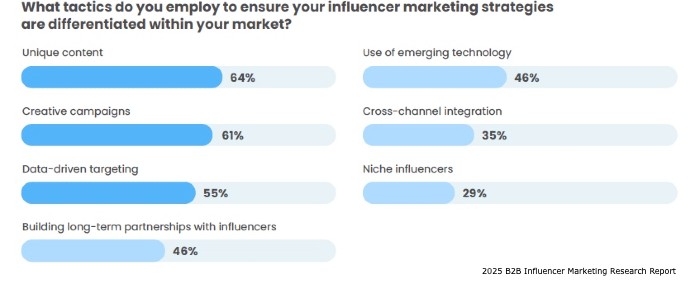
Tap influencers for what they’re best at: creating and connecting
“When creating influencer content, let the influencers drive the vision. You may have an idea, brand guidelines, and messaging you want them to say – but then why are you using them? Influencers can provide authenticity and help create a narrative that you might not have thought of. Lean into that to help make your brand stand out.”

Amy Higgins
Director of Content Strategy, Cloudflare
Case Study:
How TopRank Marketing helped Sprinklr activate top B2B influencers to launch its self-serve social media platform
Challenge:
As a top enterprise software company known for its Unified-CXM platform, sought a marketing team that could help it expand its customer base beyond large established brands to smaller enterprise social media teams. While Sprinklr’s out-of-the-box Social Self-Serve Plan met these standards, competitors had already gained a foothold in the social space, presenting the challenge of gaining traction with these new audiences.
Strategy:
With a goal of elevating key social KPIs such as reach and engagement, while driving product trials and increasing virtual attendance for Sprinklr’s Social Self-Serve Plan events, TopRank Marketing and Sprinklr launched a B2B social influencer program. The campaign was headlined by Socialverse: a documentary-style masterclass featuring prominent social media and marketing influencers.
Leveraging existing relationships and industry credibility, TopRank Marketing guided Sprinklr through the influencer selection process, securing powerhouse thought leaders Jay Baer, Ann Handley, Mari Smith, and Paul Roetzer to lead a cast that included internal experts and customers from Sprinklr who would be key for adding relevant insights.
Results:
The Sprinklr Socialverse campaign showcased the impact of B2B influencer marketing on a global scale, reaching over 5,000 event registrations from audiences in North America, EU, Asia-Pacific and the Middle East. Organic and paid messages reached over 23.4 million people and drove nearly 100,000 engagements.
Celebrated internally as Sprinklr’s “Campaign of the Year,” the success of Socialverse earned a Content Marketing Award for Best Use of Influencer Marketing for its impactful first season.
If you would like to know more about how to find the best influencers for your industry and apply best practices for content collaboration and customer engagement from awareness to lead gen, let’s talk!
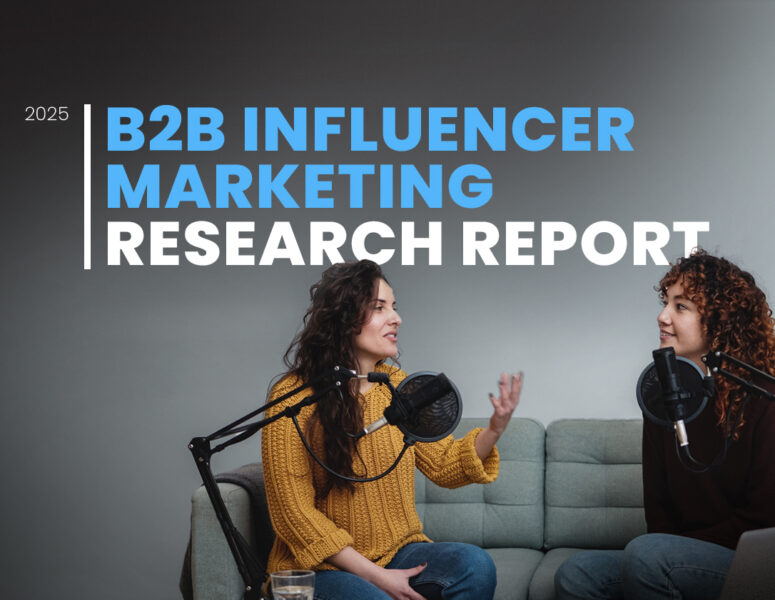
This post is based on content from the 2025 B2B Influencer Marketing Research Report, which you can get a full copy of here.
